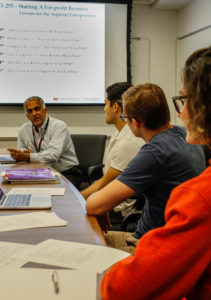Sammie Stagg
staggsam@grinnell.edu

When Professor J. Montgomery “Monty” Roper, anthropology, became director of the Wilson Center, he decided that his priority would be to fortify leadership, innovation and entrepreneurship within the Grinnell student body. “We were largely focused on soft skills,” Roper said.
Roper worked with his Wilson Center colleagues to develop the Maker Lab, a space where students could develop and build product prototypes. They brought in LeaderShape, a national nonprofit organization that holds a weeklong program in Boone, Iowa each spring where students can develop leadership skills. They developed workshops, including one that bolstered leadership by teaching students how to build empathy through storytelling, and started Pioneer Weekend, a three-day pitch contest where students can win cash prizes for winning prototypes.
“We’ve got these one-time programs, but we have not had a kind of sustained program that provides people—who might want to come out of Pioneer Weekend and then want to continue to work on something—a space where they can work on it,” Roper said.
This year, the Wilson Center created a new way to support sustained entrepreneurship: a three-part support system to help student entrepreneurs bring their visions to fruition.
The first part is the Failure Fund, which will grant up to $1500 per project to students who want funding to start a business endeavor. Roper said that the fund will support students regardless of the stage they’ve reached in the start-up process.
“It could be very, very early in the game – it could be that they don’t even have a business plan but they’ve got a basic idea and they really want some support… to develop their business plan. Maybe they’ve got a great business plan and they want to prototype something,” he said. “The real idea of the Failure Fund is to meet them where they’re at and provide them some financial support … and then to help them get to the next level.”
Roper said that he found inspiration for the fund’s name in an interview where a famous CEO was asked, ‘What’s your mark of success?’ and replied, ‘How many times they’ve failed.’ Roper advocated for the name “Failure Fund” because he wanted to emphasize to students that “you have to be able to take risks … you have to be able to learn from failure. And unfortunately at Grinnell, we don’t provide a lot of opportunities where students can safely fail.”
Students can use the funding they get from the Failure Fund to work on their projects at what Roper calls “the incubator” (an official name has yet to be established). “It’s a location, it’s a set of resources, it’s… it’s the program, in a way,” Roper said. The incubator will be staffed with student mentors and provide a space where students can work on their business ideas and get help with making them a reality.
The Wilson Center supplements their programs and funding with courses in business and entrepreneurship. This semester, Atul Gupta ’88, a trustee of the College and founder of Advanced Technologies Group is teaching a short course entitled, “Starting a For-Profit Business: Lessons for the Aspiring Entrepreneur.” Students taking the course entered with a business idea they want to explore, ready to explore scenarios that, as Gupta put it, “do happen and will happen” to their business. Gupta said that the class meets in a “discussion format, where different scenarios are suddenly thrown at them—what are you going to do with this? How do you deal with this scenario that comes up?”
Gupta says that students will leave the course with experience in defining a company philosophy, developing products, taking care of employees and ensuring strong leadership. “Each business has a different concept of balance … the ability to recognize those differences is what this class is about—it’s really running a business,” he said.
The Failure Fund and incubator programs will have a kickoff event this Sunday, from 1-3 p.m. in room N1112 of the Humanities and Social Studies Center.


































































